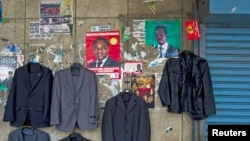Zambians go to the polls on January 20 to elect a new leader following the death of President Michael Sata in October. Edgar Lungu, candidate for the ruling Patriotic Front party, appears to have a slight advantage. He faces stiff competition, though, from popular opposition candidate Hakainde Hichilema, who has received an unexpected boost from infighting within the ruling party.
The ruling Patriotic Front (PF) was rocked by a leadership battle as contenders jostled for the presidential nomination, just days after President Michael Sata’s death in late October.
But seeds of the clashes started earlier, when Lungu, who holds the twin portfolios of justice and defense minister, was controversially appointed the party’s secretary-general in August. He ousted then-justice minister Wynter Kabimba, once considered the most likely successor to the top seat.
The party has since worked hard to overcome damage from the rocky internal nomination process, with a robust media campaign and shoring up powerful alliances with leaders of the Bemba, the largest ethnic group in the country.
Then last week, Lungu gained the endorsement of former president Rupiah Banda, who turned against his own party, the Movement for Multi-Party Democracy, the MMD.
Lungu’s greatest asset going into the polls, however, may be his affiliation with late president Sata, who had strong grassroots support.
Lusaka taxi driver Richard Peel, proudly sporting an Edgar Lungu shirt, said he wants Lungu to continue Sata’s legacy.
"We are going to vote for Eddie Lungu because we don't want things to change, they are supposed to continue and finish the term. He is going to be a good president," said Peel.
Lungu’s closest rival is Hichilema from the United Party for National Development (UPND). Hichilema, a cattle-herder-turned-economist and businessman, came third in the 2011 elections. He is widely respected for his role in the privatization of the country’s mines, but he is berated by the unions.
There are nine other candidates in the running, including Nevers Mumba from the fractured MMD.
Political analyst Alex Ng’oma said the election is too close to call at this point.
"This is an election like no other. Everyone is predicting is a 50/50 kind of contest. On paper, it would appear that the parting government has an edge. The election … is about continuity. There are certain projects that were started by the late president…that in itself speaks volumes to the people in the rural areas. So for that reason they have got a soft spot for the parting (ruling) government,” said Ng’oma.
The winner will not need an outright majority given Zambia’s first-past-the-post electoral system.
Whoever wins the by-election will face a high unemployment rate and a constitutional review, though, all while eyeing the next scheduled presidential election in 2016, according to Ng’oma.
“Let’s assume for instance that the candidate of the ruling party will win the election next week. If he doesn't perform to the expectations of the people, he will no longer be riding on the popularity that was built by the late president. If he doesn’t perform then people will abandon him and shift their allegiance…,” said Ng’oma.
The next president also will inherit a crisis of confidence in the copper mining sector, hit hard by a recent fall in prices and a newly enforced royalty hike from 6 percent to 20 percent for open-pit mines.
Tattered relations between government and mining companies will have to be painstakingly repaired.




